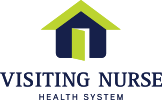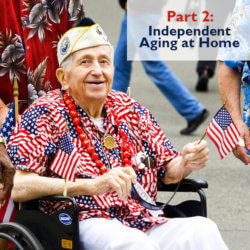Jul
18
2017
Independent Aging at Home: Part 2
By Dorothy Davis, LPC, Vice President of Community Health and Strategy
By bringing healthcare home with connectivity and innovative aging, together with the community, we work to facilitate independent aging at home. One of the benefits of bringing healthcare home is nurses are able to see the patient’s home environment. As our CEO, Norene Mostkoff, has often stated, healthcare happens at home: healthcare happens in the bathroom, it happens in the living room, it happens in the kitchen—and our nurses are able to assess whether the home environment is conducive for recovery and healthy aging. Doctors are unable to see the environment in which patients live. A diabetic could repeatedly visit the ER and the doctor would never know it because the patient doesn’t have proper refrigeration for her diabetes medicine. Deploying home health clinicians is the way to fill this gap in care. The environment in which the patient lives contributes to their health. Health is all encompassing; health is our way of life, where we live, what we do, what we eat, and who we live with.
Addressing and solving this gap in care is what is necessary to allow seniors to age with dignity and independence at home. The solution is, of course, very complex. As a nonprofit healthcare provider, Visiting Nurse partners with many organizations in our community—for-profit as well as not-for-profit—such as Resurgia, Project Open Hand, Atlanta Regional Commission, Atlanta Housing Authority and Georgia’s Alzheimer’s Association chapter. Thanks to these and other community partners, Visiting Nurse is able to provide more than $6 million annually toward programs and community services that help seniors age independently at home.
Humanize & Educate
Providing person-centered care means we humanize healthcare by giving voice to the patient. Seniors, just like anyone else, wish to be independent and self-sufficient, so by working with these community partners we ensure patients have the type of independence that is most appropriate for each of them. Unfortunately, caregivers and medical providers too often take over and don’t ask what the patient wants, forgetting the patient is supposed to be at the center of care. Language matters when it comes to aging, and it’s important to refer to it as a natural process. Aging is not a disease—actually, aging is a gift many do not get to experience. At Visiting Nurse, we’ve adopted a model of care that is not tied to time with the patient, because connecting on a deeper level with each patient is important to us. We choose to take our time with patients so we can learn more about what each patient desires from his or her care.
Providing patient education through our community partners is important to aging independently. We teach patients to understand and predict things that will happen as they age. We help them make tough decisions, including helping them to be more financially independent. Financial education can restore dignity to aging patients, giving them power in choice and a voice in their care.
Connectivity & Processes
Our processes are built around the aging population we serve. We’re currently developing ways to keep patients connected with us and their families through tv or a smart phone. Using this technology, patients will be able to build their own tailored individual care circles, giving each person a specific role in their care. For many families with multiple children, each child will have their own role in the parents’ health care. Utilizing strategic processes and connectivity, our staff keeps patients at home an average of four years longer than if they had no care at all, helping to facilitate a feeling of independence for our patients. Connectivity is important with aging patients and those with chronic disease; it enables the patient to be engaged in their care, if they are able. With annual competencies about aging and with a practice set around aging, we help patients understand their medical conditions that will result in more independence.
One Patient’s Story
Aging seniors deserve to feel independent, and that means providing care from multiple angles. A wonderful woman currently in our hospice program, who has been a patient of ours since 2010, values her matriarchal independence. In her quest for independence, she relied upon her nurses and the community programs with which we partner. We helped her with relocating to a new home and financial education throughout the years. We helped her maintain this dignity in independence which is clearly so important to her through the provision of services from our community partners. Moms Meals provided her with meals throughout the years, her emergency button to request medical help is provided through Linked to Life and her home aid service comes from Right at Home. In addition, a medication management nurse taught her how to use her medication correctly and safely on her own. She’s currently happy and comfortable, right where she wants to be, according to her nurse, with whom the patient has developed a close relationship. Her nurse visits her more frequently now, even outside of regularly scheduled visits just to check up on her. She wanted to remain independent, even at the end-of-life, so we created an environment in her home that was conducive to her care. We are honored to have facilitated her independence throughout her journey with us as a patient. She has formed relationships with many of the staff and we will always appreciate her tenacity to remain independent.
For more information on aging independently , read the first part of this blog about our approach to medical care.

